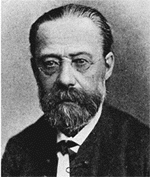| Epoch: Romantic
Country: Czech Republic |
| Bedrich Smetana (1824-1884)
voor meer portretten en dergelijke:
|
 |
| Czech composer
and conductor. Smetana was one of the founders of the Czech nationalist
movement.
Bedrich Smetana learned violin from his father, an avid amateur violinist, and from local teachers. He was a mediocre student at the local school, preferring to spend his free time at concerts and composing string quartets for his friends. He moved to Prague, where he continued his studies and made a precarious living as a teacher. He managed an appointment as piano teacher for the family of Count Leopold Thun, which allowed him to pursue his study of harmony and composition, but his career continued on an unsuccessful path. He failed in trying to start his own music school, and likewise failed in an attempt to begin a concert career. His problems were compounded by family tragedy: between 1854 and 1856, three of his four young daughters died. With his career going nowhere in Prague, Smetana took a job teaching piano in Göteborg, Sweden. Here he finally found some measure of success, marred however by the death of his wife in 1859. In the early 1860s, he felt called to return to Prague, where a strong nationalist movement was growing. In 1866 his first opera was premiered with great success, and he was appointed to conduct at the national theater. His second opera, The Bartered Bride, finally established his reputation. Smetana continued conducting and composing, beginning work on his cycle of nationalistic tone poems, Má vlast (My Country) -- of which "The Moldau" is the best known. In 1874 he began to exhibit symptoms of syphilis, which affected his hearing. Increasing mental problems led to his institutionalization in 1884. He died within a month. Smetana's music is
typical for the time, full of melody and with direct appeal to his audience.
His portrait of the Moldau River is a perfect example of programmatic music.
In it, he provides his listener with a musical tour down the river, with
a peasant wedding on one side and stately castles on the other. Yet there
is more in Smetana's music than the simple creation of musical pictures.
His operatic subjects and the programs of his instrumental works focused
mainly around aspects of his homeland. After the many nationalist revolts
of 1848, the desire for independence from the outside domination of the
Austrian Empire inspired artists, writers and musicians throughout central
and eastern Europe. Smetana's creation of a national music (carried on
by composers such as Antonín Dvorák) marks an important chapter
in the Romantic movement of the nineteenth century.
Works:
Chamber music and keyboard works, choral music and songs |